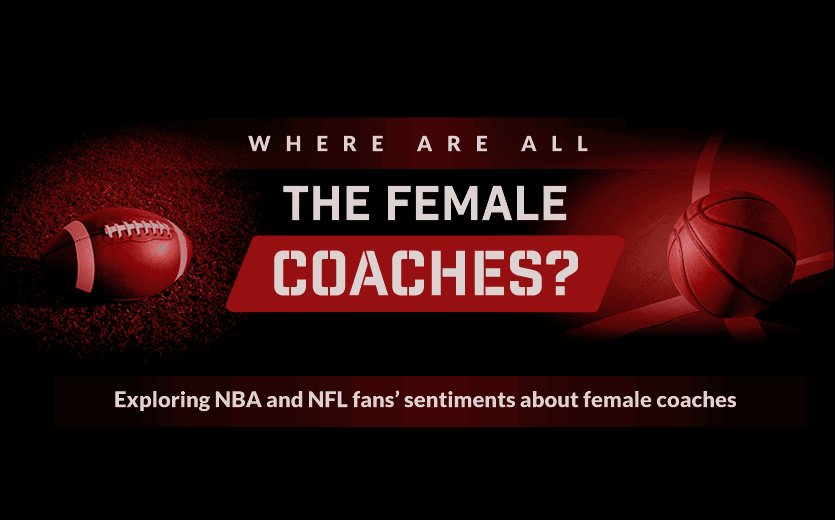Key Insights
- An impressive 93% of sports enthusiasts are in favor of a female head coach—92.8% among NFL fans and a striking 94% within the NBA realm.
- A substantial 70.3% of both NBA and NFL supporters indicated they would bolster their support for a female coach, provided their favorite player endorsed her as well.
- Approximately 15.1% of fans from the NBA and NFL hold the belief that teams led by female coaches may not achieve the same level of success as their male counterparts.
- One in four fans expressed concerns that male athletes might feel emasculated under female leadership.
The Landscape for Female Coaches in Major League Sports
The intriguing paradox of professional sports in the U.S. reveals that, despite the existence of both men’s and women’s leagues, the coaching domain remains overwhelmingly male-dominated. To unpack this issue, we engaged 1,208 NBA and NFL fans in a survey aimed at gauging their feelings, particularly regarding the acceptance of female head coaches.
We dissected support levels down to individual teams, delved into the stereotypes surrounding female coaches, and gathered insights on what experiences respondents believe are essential for women to thrive in elite coaching roles.
Nevertheless, the path to gender equality in coaching is strewn with obstacles—rampant sexism, systemic pay disparities, and a sparse support network for women all conspire against qualified candidates. As we explore these concepts, a clearer picture of the gender disparity in coaching across the nation emerges.
Challenging Beliefs
Initiating our inquiry, we sought fans’ perspectives on the support for female coaches and the prejudices they might harbor.
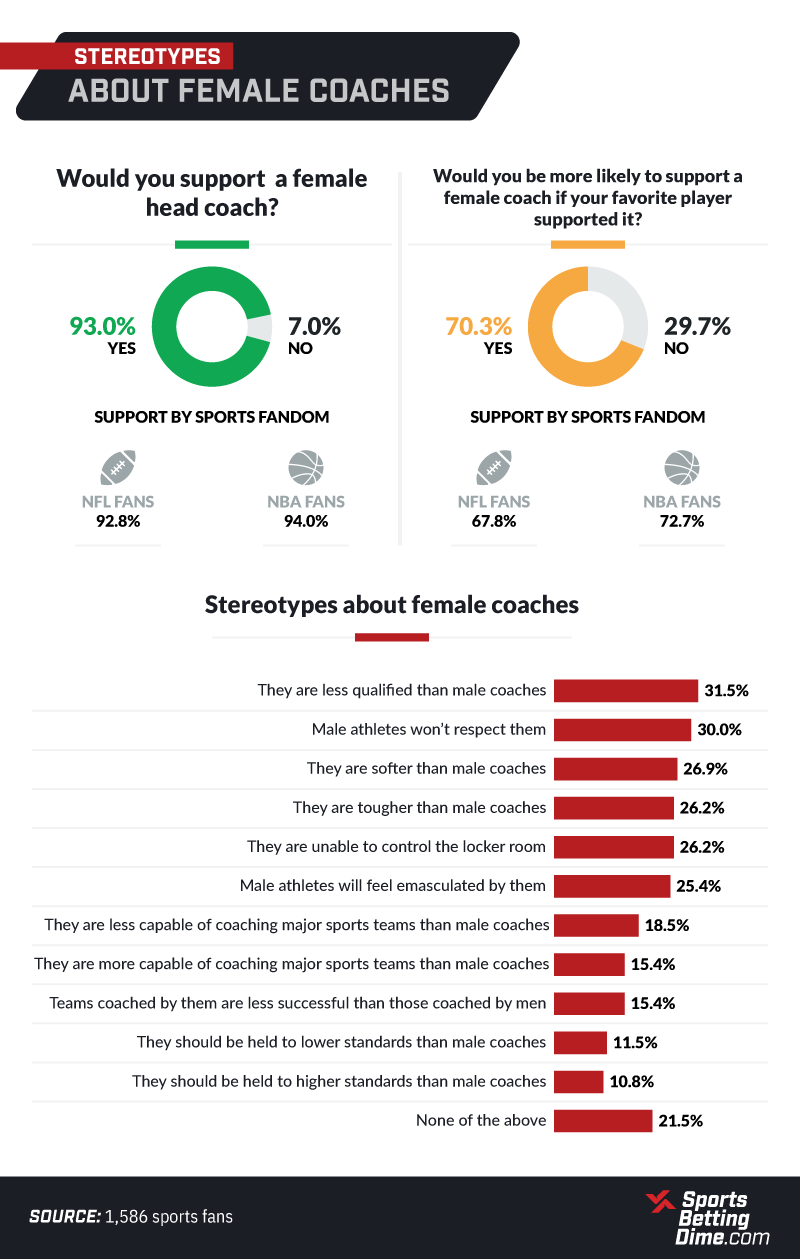
What we found was a resounding consensus: an astounding 93% of participants favored having female head coaches. Additionally, 70.3% stated that if their favorite player supported a female coach, their own endorsement would follow suit. While NBA fans exhibited slightly greater enthusiasm for this notion than NFL supporters, it is crucial to note that these self-reported findings may be tainted by a desire to avoid prejudice.
However, the existence of stereotypes looms large. Over one-third of fans expressed skepticism about the competency of female coaches compared to their male peers. A disconcerting 15.4% felt that teams led by women wouldn’t achieve comparable success, while over a quarter speculated that male athletes would feel diminished under female leadership. Such assertions are troublingly unfounded, particularly given the dearth of representation of women in professional sports coaching—currently, only eight women hold coaching positions in the NFL amongst a sea of male counterparts.
Back in 1972, lawmakers laid the groundwork for change with the introduction of Title IX, aimed at promoting gender equity. At that time, over 90% of women’s teams across two dozen sports were helmed by female coaches. Alarmingly, this figure has plummeted to about 40% in recent years. Factors contributing to such disparity range from a surge of male interest in coaching female teams, attracted by lucrative salaries, to a staggering 80% of college athletic directors being male—creating significant barriers to entry for aspiring female coaches.
Support in the NFL
Subsequent to our initial findings, we scrutinized the sentiments of NFL fans, analyzing support levels for female coaches across different franchises.
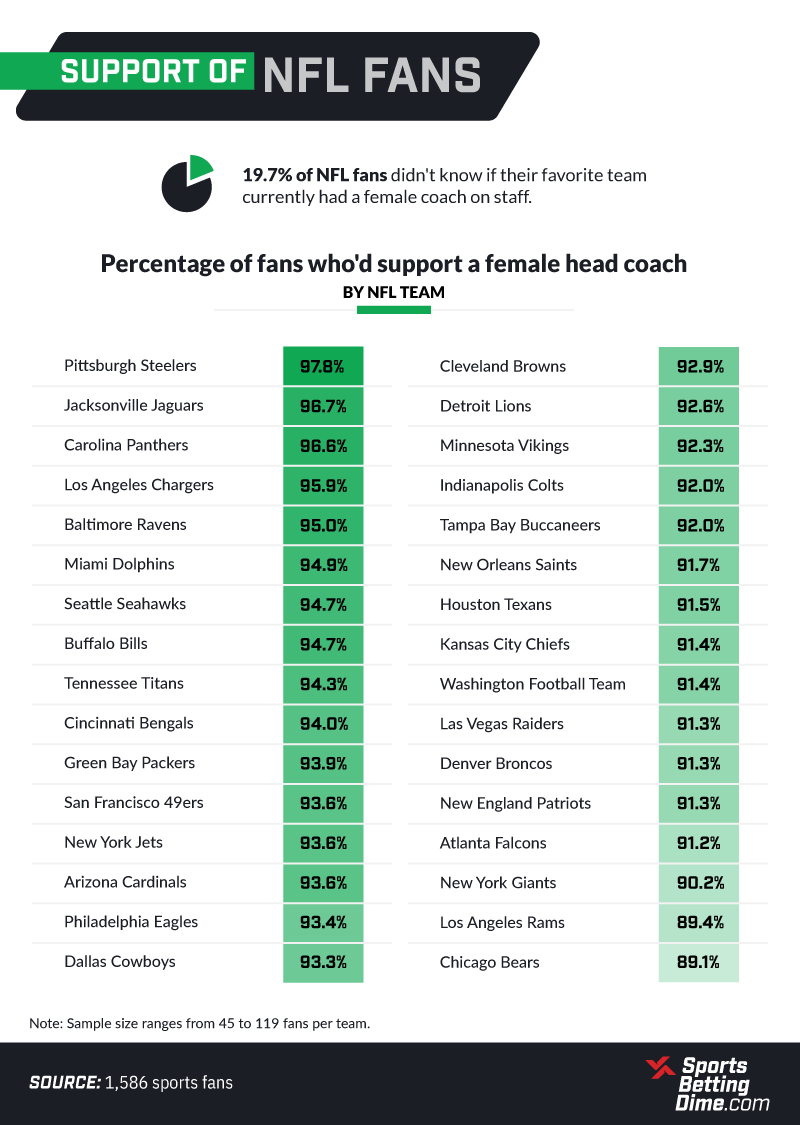
Given the scarcity of female coaches within the NFL, it’s noteworthy that nearly 20% of fans were oblivious to whether their favorite team had a female coach. Among supporters, the Pittsburgh Steelers rose to the forefront with an astonishing 97.8% backing female head coaches; a solid majority of 29 other franchises shared this sentiment with over 90% acceptance. Only the Los Angeles Rams and Chicago Bears trailed slightly at 89.4% and 89.1%, respectively. This collective support showcases a burgeoning acceptance of female leadership throughout the league.
The narrative took a revolutionary turn when the Arizona Cardinals hired Jen Welter as a coaching intern in 2015, marking the dawn of female coaching in the NFL. Welter, who cultivated her passion for the sport as a child, boasted 14 years of playing experience in female leagues. Despite constant skepticism and barriers, she emerged as a groundbreaking figure, eventually becoming the first female non-kicker to participate in a professional men’s indoor football league. Her journey exemplifies resilience and the model for future trailblazers in the sphere of coaching.
Support in the NBA
Similarly, we explored the landscape among NBA fans, seeking their views on female coaching and the disparities that may arise across teams.
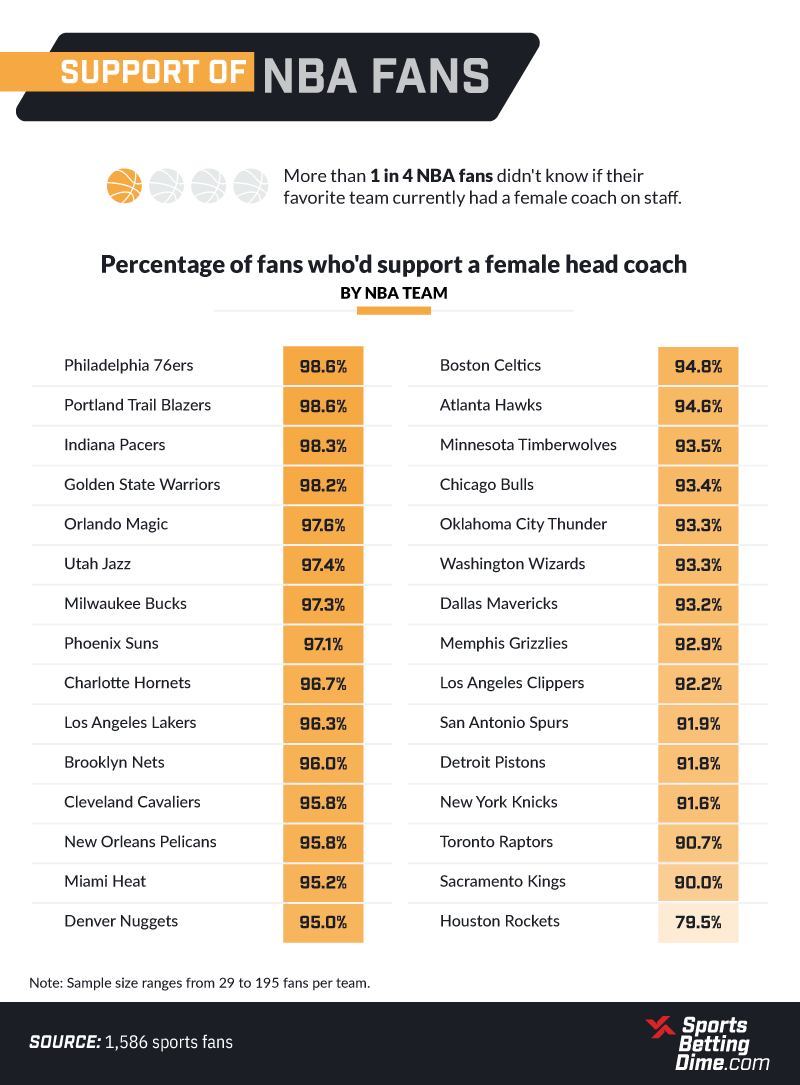
As in the NFL, a significant number—over 25%—of NBA fans were unaware of whether their favored team boasted a female coach among its ranks. Yet, the findings revealed that an overwhelming majority of more than 90% voiced their support for the appointment of female head coaches, with fans of the Philadelphia 76ers and Portland Trail Blazers leading the charge at an extraordinary 98.6% acceptance rate. Only the Houston Rockets fell below the threshold at a lower rate of 79.5%.
On December 30, 2020, during a game, San Antonio Spurs head coach Greg Popovich was ejected, and in a historic moment, Becky Hammon, serving as his assistant, took the reins as head coach, marking a momentous milestone as the first woman to lead an NBA team in-game.
Paving the Way
Looking ahead, we probed fans on the influence female coaches could wield and the experiences deemed vital for their success.
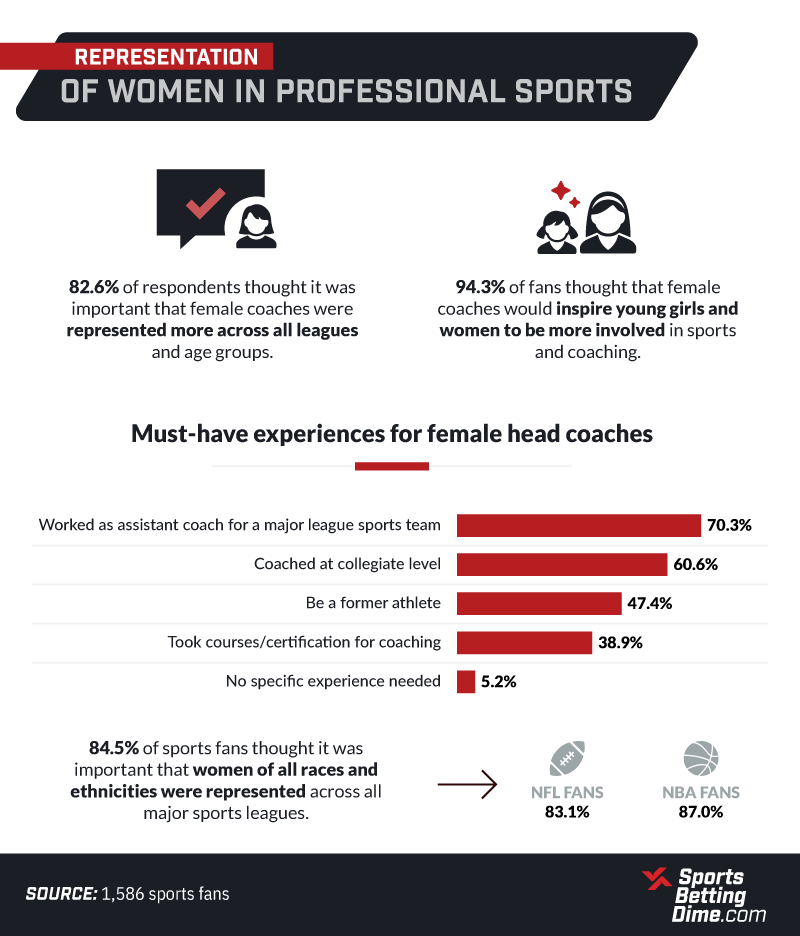
An impressive 80% of respondents felt female coaches warranted greater representation across all leagues and age categories. Interestingly, this belief was echoed by 88.3% of Democratic respondents, contrasting with 78.5% of independents and 73% of Republicans.
Moreover, a staggering 94% of both NFL and NBA fans recognized the necessity of female coaches to inspire the forthcoming generations of young women to participate more actively in sports and coaching roles. To truly carve out a successful coaching career, 70.3% of respondents highlighted the importance of obtaining experience as an assistant coach within a major league team, while over 60% believed collegiate coaching experience, along with formal training and certifications, would be pivotal for success. Take the remarkable example of Becky Hammon, who showcased her prowess through 16 illustrious seasons in the WNBA, earning multiple accolades and cementing her qualification for a head coach position.
A New Era
Though glaringly underrepresented in the coaching arena, it is heartening to witness nearly universal fan support across the NFL and NBA for the inclusion of female head coaches. Numerous stereotypes continue to circulate questioning their capabilities; yet without substantial trial, such sentiments remain unsubstantiated. What remains glaringly obvious is the systemic marginalization faced by women in the professional coaching arena, coupled with a multitude of barriers that men seldom encounter.
As fans ponder the qualifications necessary for women in these high-stakes roles, the legacies of figures like Becky Hammon and Jen Welter shine brightly, illuminating the path for women aspiring to make their mark in coaching. Supported by the public, it’s high time to dismantle these outdated stigmas and embrace a new era of inclusivity and excellence.
Methodology
This study draws from a survey of 1,586 NBA and NFL fans throughout the U.S. Respondents were obtained via the Amazon Mechanical Turk survey platform, where they answered a series of questions, including attention and disqualification queries. A majority—62.9%—identified as male, while 37.1% identified as female. Ages ranged from 19 to 75, with an average age of 38. In terms of political affiliation, 51.7% were Democrats, 28.7% were Republicans, and 19.6% identified as independents. Responses deemed invalid due to attention-check failure were discarded. The study maintains a 3% margin of error with a 95% confidence interval.
It’s essential to understand that self-reported survey data may be skewed by exaggeration, recency bias, and telescoping.

